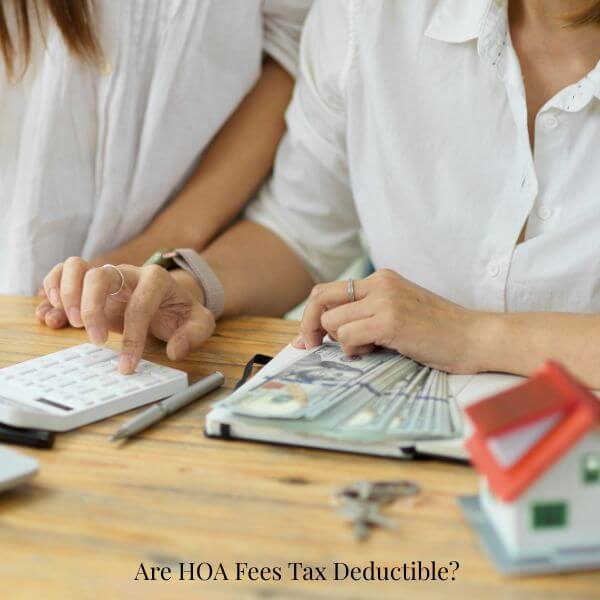Last Updated on December 29, 2025 by Amrita Das
Homeowners Association (HOA) fees can take a significant bite out of your budget. These monthly or annual payments range from modest amounts to well over $1,000 per month in luxury communities. With such substantial costs, many homeowners wonder: Is HOA Tax Deductible?
The answer isn’t straightforward. While most homeowners can’t deduct HOA fees, there are specific situations where these expenses become tax-deductible. This guide will help you understand when you can claim HOA fees as deductions and how to report them accurately on your tax return.
Read More: Does Paying Property Tax Give Ownership?

Understanding HOA Fees and Their Purpose
A Homeowners Association is a governing body that manages and maintains shared spaces in residential communities. Whether you live in a condominium, gated community, townhouse complex, or planned development, your HOA collects fees to cover various expenses.
These fees typically fund:
- Landscape maintenance and gardening
- Snow removal and parking lot upkeep
- Pool and clubhouse maintenance
- Security services
- Building repairs and exterior maintenance
- Insurance for common areas
- Administrative costs
HOA fees are mandatory expenses that come with property ownership in these communities. You can’t opt out of paying them while living in the community.
Additional Reading: How To Pay No Taxes On Rental Income? A Detailed Guide
Weighing the Pros and Cons of HOA Fees
Advantages of HOA Fees
HOA fees offer several benefits that can enhance your living experience and property value:
- Access to Premium Amenities: Many HOA communities provide facilities like clubhouses, gyms, tennis courts, and swimming pools that would be expensive to maintain individually.
- Dispute Resolution: HOAs serve as mediators when neighbors have disagreements, helping maintain community harmony.
- Enhanced Security: Gated communities and security services provide additional safety measures for residents and their families.
- Property Value Protection: HOAs enforce rules and standards that help maintain uniform aesthetics and prevent activities that could negatively impact property values.
- Professional Maintenance: Common areas receive regular upkeep, ensuring the community remains attractive and well-maintained.
- Community Building: HOA communities often foster stronger neighbor relationships through organized events and shared spaces.
Disadvantages of HOA Fees
Despite their benefits, HOA fees come with several drawbacks:
- Recurring Costs: Monthly or yearly fees represent an ongoing financial obligation that continues as long as you own the property.
- Restricted Property Rights: You cannot make changes or additions to your property without HOA approval, limiting your freedom to customize your home.
- Mandatory Compliance: You must follow HOA rules even if you disagree with them, which can feel restrictive.
- Potential Foreclosure: In extreme cases, failure to pay HOA dues could result in foreclosure proceedings against your home.
- Limited Control: As an individual homeowner, you have limited influence over how fees are spent or what rules are implemented.
Are HOA Fees Tax Deductible? The General Rule
The fundamental rule for HOA fee deductibility is simple: HOA fees are only tax deductible when the property generates business income or is used for business purposes.
For most homeowners living in their primary residence, HOA fees are considered personal living expenses—similar to utilities, groceries, or other household costs. These personal expenses cannot be deducted on your federal tax return.
However, three specific scenarios allow you to deduct HOA fees:
- Rental properties that generate income
- Home-based businesses that use part of your residence
- Mixed-use properties that combine personal and business use
Let’s explore each situation in detail.
When HOA Fees Are Tax Deductible?
Rental Properties: Full Deduction Allowed
If you own rental property subject to HOA fees, you can deduct the entire annual HOA expense as a business cost. This applies whether the property is:
- A dedicated rental property you never personally occupy
- A vacation home you rent out year-round
- A second home you rent through platforms like Airbnb or VRBO
Example: You own a condo that you rent for $2,000 per month with annual HOA fees of $3,600. You can deduct the full $3,600 as a rental property expense on Schedule E of your tax return.
Mixed-Use Properties: Partial Deduction
When you use your primary residence for both personal living and rental income, you can only deduct the portion of HOA fees that corresponds to the rental period.
Example: You live in your home for 8 months and rent it out for 4 months. If your annual HOA fees are $2,400, you can deduct $800 (4 months ÷ 12 months × $2,400) as a rental expense.
Home-Based Business: Proportional Deduction
If you operate a business from your home, you may deduct the portion of HOA fees that corresponds to your business use of the property. The IRS offers two ways to figure this deduction:
Simplified Method
- Deduct $5 per square foot of business space
- Maximum deduction covers 300 square feet ($1,500 total)
- No additional calculations required
Regular Method
- Determine the Proportion of Your Home Allocated for Business
- Multiply your annual HOA fees by this percentage
- Requires detailed record-keeping but may yield larger deductions
Example using the regular method:
- Your home is 2,000 square feet
- Your home office is 200 square feet
- Business use percentage: 200 ÷ 2,000 = 10%
- Annual HOA fees: $2,400
- Deductible amount: $2,400 × 10% = $240
What HOA Expenses Are Never Deductible?
Special Assessments for Improvements
While regular HOA fees may be deductible in certain situations, special assessments for capital improvements are typically not. These assessments usually add to your property’s cost basis rather than providing immediate tax deductions.
Personal Amenity Usage
Fees specifically related to personal amenities (like gym memberships included in HOA fees) remain non-deductible even for rental properties, as they don’t relate to the business purpose of renting the property.
Are HOA Fees Tax Deductible on State Income Taxes?
The tax deductibility of HOA fees varies from state to state. While some states may follow the federal guidelines, it is important to check with your state tax authority for specific information regarding the deductibility of HOA fees on your state income taxes.
In general, if you are eligible to deduct HOA fees from your federal taxes, it is likely that you will also be able to do so on your state taxes. However, it is always best to confirm this with your state tax authority.
Furthermore, even if you cannot deduct HOA fees from your state income taxes, there may be other deductions or credits available for homeowners that can help offset the cost of these fees.
State-Specific Rules: California and Florida
HOA Fee Tax Deductibility in California
California follows federal tax guidelines regarding HOA fee deductions. The fees may be tax deductible if you use your home for business purposes or rent it out to others.
For business use, you can deduct the percentage of HOA fees that corresponds to your business usage. If your home office comprises 15% of your home’s total square footage, you can deduct 15% of your HOA fees as a business expense.
Rental property owners can deduct HOA fees as rental expenses, including both regular maintenance fees and special assessments. However, if you use your home solely for personal purposes, HOA fees remain non-deductible personal expenses.
HOA Fee Tax Deductibility in Florida
Florida residents face similar rules regarding HOA fee deductions. The state doesn’t impose additional restrictions beyond federal guidelines.
HOA fees used for general maintenance and upkeep of common residential areas are not tax deductible when the property serves as your personal residence. However, Florida homeowners may deduct HOA fees in these situations:
- Business use: Deduct the portion corresponding to your home office or business space
- Rental property: Deduct fees as rental expenses
- Capital improvements: Fees for specific improvements that increase property value may qualify as capital improvement expenses
Common Misconceptions About HOA Fee Deductions
Many homeowners hold incorrect beliefs about HOA fee tax deductibility:
Misconception: All HOA fees are tax deductible because they maintain property values.
Reality: Personal use of your home makes HOA fees non-deductible, regardless of their impact on property values.
Misconception: Special assessments are always deductible.
Reality: Special assessments follow the same rules as regular HOA fees—they’re only deductible for business use or rental properties.
Misconception: Moving to a no-HOA community eliminates all similar expenses.
Reality: While you avoid HOA fees, you’ll likely face individual costs for maintenance, security, and amenities that HOAs typically provide.
Maximizing Your HOA Tax Benefits
Keep Detailed Records
Whether you’re claiming HOA fees as rental expenses or home office deductions, maintain comprehensive records:
- Annual HOA fee statements
- Receipts for special assessments
- Documentation of rental activity
- Records of home office usage
Separate Business and Personal Use
If you’re deducting HOA fees for a rental property or home office, clearly separate business and personal use. This documentation will be crucial if the IRS questions your deductions.
Consider Professional Help
Tax laws surrounding real estate deductions can be complex. Consider consulting with a tax professional who can review your specific situation and ensure you’re maximizing legitimate deductions while staying compliant with IRS regulations.
Read More: Do Churches Pay Property Tax? A Comprehensive Guide
Is HOA Tax Deductible? Conclusion
Understanding HOA fee tax implications can influence your real estate decisions. When evaluating properties with HOA fees, consider:
- Your intended use of the property
- The potential for rental income
- Your business needs for a home office
- The total cost of ownership, including non-deductible HOA fees
This knowledge enables you to make informed decisions about property purchases and usage that align with your financial objectives.
Keep in mind that tax laws are complex and subject to frequent changes. While this guide provides general information about HOA fee deductibility, your specific situation may have unique considerations.
Please always consult with a qualified tax professional to make sure you’re maximizing your deductions while staying compliant with current tax laws.
